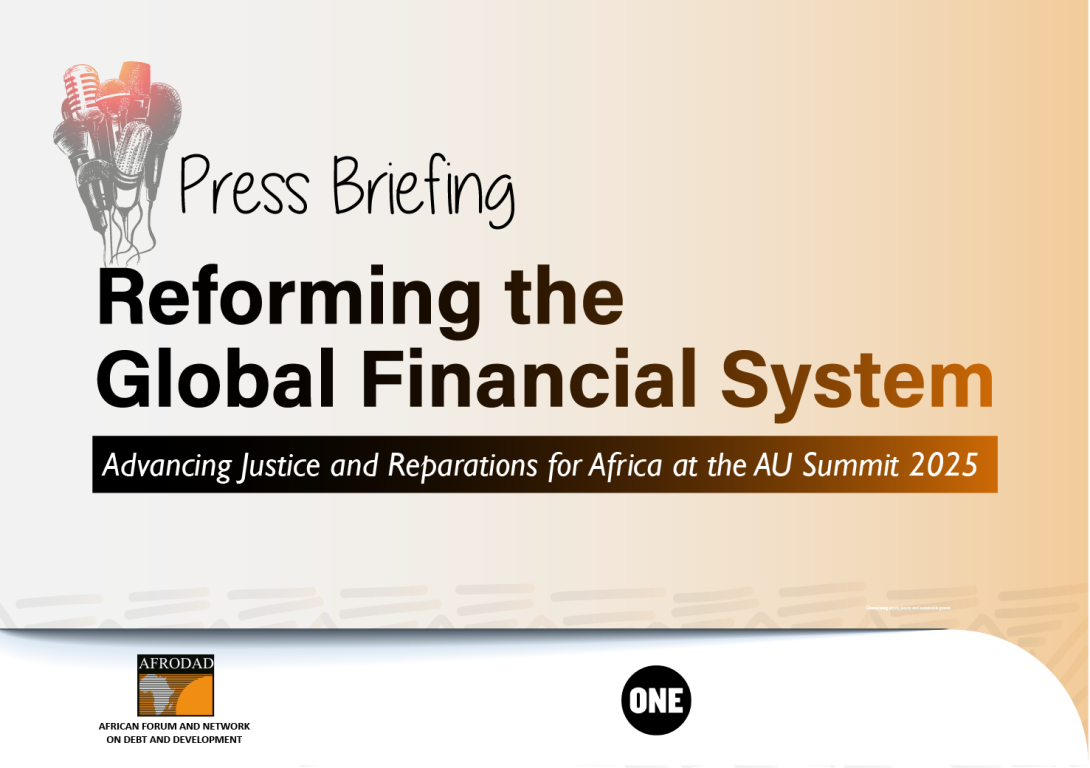Date
12 February 2025

Reparative Justice for Africa: A Call to Action at the AU Summit 2025
FOR IMMEDIATE RELEASE
[Addis Ababa, Ethiopia, February 12, 2025]. As the African Union Summit 2025 commences, the African Forum and Network on Debt and Development (AFRODAD), The One Campaign, and Christian Aid emphasise the critical need for reform of the global financial architecture to address the pressing challenges facing Africa. The summit's theme is centered on "Justice for Africans and People of African Descent through Reparations". Reparations are not merely a financial issue; they encompass broader systemic reforms aimed at dismantling the legacies of colonialism and slavery. The AU's commitment to reparatory justice highlights the necessity of addressing historical injustices while fostering a more equitable future for all Africans. In a press briefing, the partners highlighted the urgent necessity for debt cancellation, equitable access to capital, and reform of global financial institutions that perpetuate colonial inequalities. These elements are fundamental to addressing the issues of debt, climate finance, and the demand for a more equitable global financial system.
There are deep-rooted inequalities within the current global financial system, which disproportionately affects African nations. The system is dominated by institutions like the International Monetary Fund (IMF) and the World Bank which prioritises creditor interests over the developmental needs of African countries. Africa is facing a debt crisis, with many nations paying more to service their debts than to invest in health and education. The unsustainable debt is exacerbated by a high cost of borrowing; with African nations repaying significantly higher interest rates compared to their developed countries counterparts, perpetuating a cycle of economic dependency and instability.
While the continent contributes only 2-3% of global emissions, it is disproportionately affected by the climate crisis, primarily caused by wealthier nations. To resolve this within the framework of reparative justice, grant-based climate finance and new forms of taxation such as polluter pays taxes and taxes on high net-worth individuals should be used as an integral component of the reparative justice agenda. The AU summit presents a pivotal opportunity for African leaders to unite and advocate for meaningful reforms. With the African Union's membership in the G20 and South Africa's presidency, there is a unique platform to push for changes that address the continent's economic challenges and sovereignty. The upcoming 4th International Conference on Financing for Development Conference further amplifies this opportunity, allowing African nations to collectively call for a fairer financial system that recognizes their needs and contributions. These are unique opportunities in the struggle to transform Africa into a Rule Maker and not a Rule Taker!
In this context, the role of journalists and the media is paramount. They serve as watchdogs, holding leaders accountable and ensuring that the voices of the most affected communities and marginalised groups are amplified. By reporting on the challenges faced by African nations and the urgent need for reform, the media will play a crucial role in shaping public discourse and influencing policy decisions.
Serah Makka, the Africa Executive Director at ONE Campaign said:
“Africa is standing at a pivotal moment for its economic future. The current global financial architecture was designed in a world where African nations were colonies. Today, we are abiding by rules that actively push us back from developing. Reforming this system is not just about justice; it is about survival. We must demand action and ensure our leaders take responsibility for both internal and external reforms.”
Adrian Chikowore the Senior Pan-Africa Advisor at Christian Aid said:
“The legacies of slavery, colonialism, and apartheid have left deep scars on African societies. The current global financial system, dominated by institutions like the IMF and World Bank, perpetuates these inequalities. Debt cancellation, an increase in international public climate finance, and the decoloniality of these institutions are critical steps toward reparative justice for Africa.”
Dr. Theophilus Jong, the Policy and Advocacy Manager at AFRODAD said:
Reforming the global financial architecture is not just about changing the rules but also the structures that govern current institutions driving the global financial architecture. African countries must move from being rule-takers to rule-makers. This requires coordinated efforts, strong leadership, and a focus on addressing illicit financial flows and other systemic issues that drain Africa's resources.
---
AFRODAD is a Pan-African organisation committed to assisting the long-term development of the continent; by promoting prudent debt and resource management, while also supporting the development of solutions to multiple intersecting crises: www.afrodad.org I media@afrodad.org
The ONE Campaign is a global, nonpartisan organization advocating for the investments needed to create economic opportunities and healthier lives in Africa. Our trusted advocacy uses hard-hitting data, grassroots activism, political engagement, and strategic partnerships to influence decision-makers. Learn more at www.one.org
